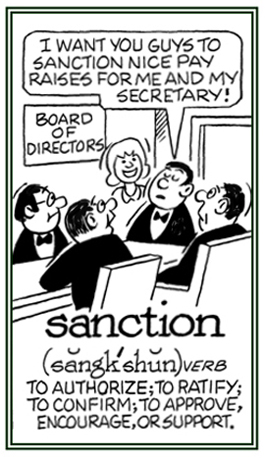You searched for:
“sanctions”
1. In law, something that is extended to include a provision of rewards for obedience, along with punishments for disobedience, to a law.
2. In politics, economic or military action taken by a state or alliance of states against another as a coercive measure; usually to enforce a violated law or treaty: The international community imposed sanctions on a country for its illegal political actions.
3. An encouragement given, intentionally or otherwise, to an opinion or practice by a person of influence: The President's apparent sanction encouraged the politician to continue running for Congress.
4. Something which serves to support, authorize, or to confirm an action, procedure, etc.: Sanctions against another country have been lifted.
2. In politics, economic or military action taken by a state or alliance of states against another as a coercive measure; usually to enforce a violated law or treaty: The international community imposed sanctions on a country for its illegal political actions.
3. An encouragement given, intentionally or otherwise, to an opinion or practice by a person of influence: The President's apparent sanction encouraged the politician to continue running for Congress.
4. Something which serves to support, authorize, or to confirm an action, procedure, etc.: Sanctions against another country have been lifted.
To impose sanctions upon a person or a nation in order to penalize; such as, something is taken or an order that is given to force a country to obey international laws by limiting or stopping trade with that country, by not allowing economic aid, etc.; usually, expressed as "sanctions against" or "imposing sanctions.
Beijing calls Taiwan deal a "gross intervention" and applies unusual sanctions.
The Chinese government has announced a broad series of measures in retaliation for new U.S. weapons sales to Taiwan, including the unusual step of imposing sanctions on American companies that supply the weapons systems.
sanction (verb), sanctions; sanctioned; sanctioning
1. To ratify or to confirm by an authorized enactment: The President sanctioned restrictions to other countries regarding certain products to the United States.
2. To indicate an action that is authorized by a government agency: The government has sanctioned the use of force in stopping imports of specific items from other countries.
3. To allege or to justify something as being permissible: The plan to lower prices for certain items was sanctioned by the board of directors of Sam's company.
4. To enforce a law, a legal obligation, etc. by attaching a penalty for some kind of transgression: The President is sanctioning the permission of refugees from other countries to enter the U.S.
5. Etymology: from Latin sanctionem, "the act of decreeing or ordaining" from sancire, "to decree, to confirm, to ratify."

© ALL rights are reserved.
Go to this Word A Day Revisited Index
2. To indicate an action that is authorized by a government agency: The government has sanctioned the use of force in stopping imports of specific items from other countries.
3. To allege or to justify something as being permissible: The plan to lower prices for certain items was sanctioned by the board of directors of Sam's company.
4. To enforce a law, a legal obligation, etc. by attaching a penalty for some kind of transgression: The President is sanctioning the permission of refugees from other countries to enter the U.S.
5. Etymology: from Latin sanctionem, "the act of decreeing or ordaining" from sancire, "to decree, to confirm, to ratify."

Go to this Word A Day Revisited Index
so you can see more of Mickey Bach's cartoons.
This entry is located in the following unit:
sanct-, sancti-
(page 2)
Word Entries at Get Words:
“sanctions”
sanction, sanctions
1. To permit or to officially accept or to allow something; "The government will sanction the use of force."
2. A penalty or an action that is taken or an order that is given to force a country to obey international laws by limiting or stopping trade with that country, by not allowing economic aid for that country, etc.; "The United Nations has decided to impose economic sanctions on the country."
2. A penalty or an action that is taken or an order that is given to force a country to obey international laws by limiting or stopping trade with that country, by not allowing economic aid for that country, etc.; "The United Nations has decided to impose economic sanctions on the country."
An event may be sanctioned by some authority, while a country might suffer sanctions for its actions.
This entry is located in the following unit:
Contranyms
(page 2)
